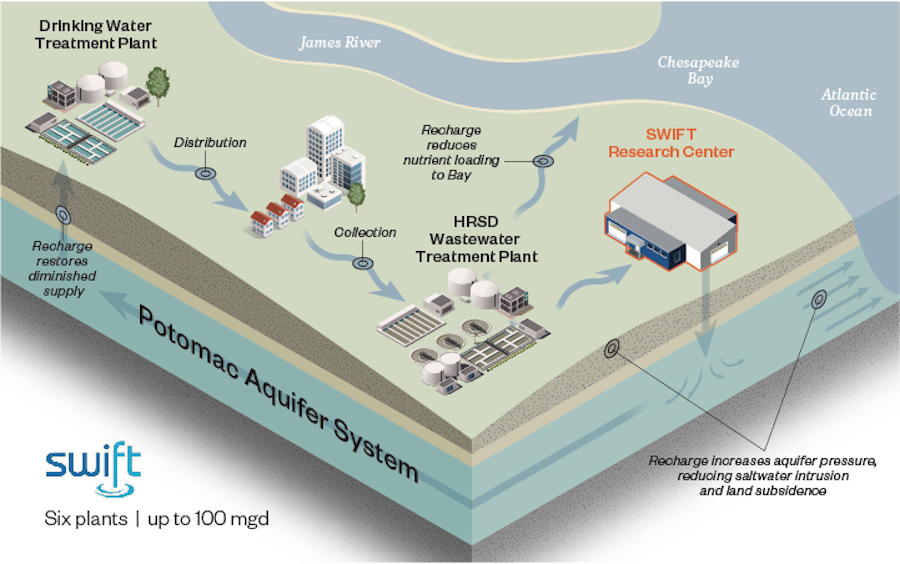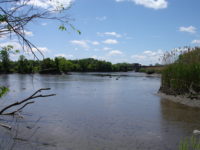Data gained from measuring projected beneficial outcomes of a $2.2-billion aquifer replenishment program now underway has allowed the Hampton Roads Sanitation Water District in Virginia to defer some stormwater improvement projects and modify a 2010 consent decree with the U.S. Environmental Protection Agency
According to district officials, the Sustainable Water Initiative for Tomorrow (SWIFT) program under construction has radically changed the calculus for the level of sanitary sewer overflow improvements that will be needed to reduce water pollution in the Chesapeake Bay watershed.
Sewer overflows in the Hampton Roads district are relatively rare, affecting only a few areas within the district each year, but the ones that exist are problematic and hard to fix, says Ted Henifin, district general manage. Taking an across-the-board approach to the work for just a few challenging overflows, as outlined in the latest iteration of the consent decree from 2013, would be overkill, he says.
As a result, the district quantified the projected levels of nitrogen and phosphorus that are being released by the overflows, compared to the nutrient reductions expected from the SWIFT program, and shared that information with EPA.
The data showed that the SWIFT projects, if incorporated into the overall wet weather program, could allow some sewer project deferrals.“We can get better environmental benefits earlier for the same dollars invested,” Henifin says.
However, there is a caveat: if the SWIFT program does not produce results, the district will need to move forward with the additional sewer projects, according to the consent decree terms..
The U.S. Justice Dept. filed the proposed modification with the U.S. District Court of Eastern Virginia on Nov. 22. Larry Starfield, acting administrator for EPA’s Office of Enforcement and Compliance Assurance, said in a statement that the agency and the state "worked with the [district] to develop a long-term solution that will improve water quality for all communities, including those that are historically underserved and overburdened by pollution.”
The modified consent decree will require the district to stick to schedules that are included in its wet weather management plan, which calls for Hampton Roads to spend about $410 million between 2020 and 2040 on 15 priority projects that will reduce overflow frequency and volume.
The SWIFT program, which broke ground on its first facility – a research building -- in 2017, involves injecting wastewater that has undergone additional advanced treatment into an underground aquifer rather than discharging it to local surface waters, which will reduce district discharges to the bay by 90%. The treated water meets drinking water standards and also matches the chemical composition of the water in the aquifer. The SWIFT research center is complete, and currently adds 1 million gallons of SWIFT Water to the Potomac Aquifer daily.
The district is now working with Ulliman Schutte Construction and Alberici on design work for the next phase—the expansion of the James River wastewater treatment plant to provide 16 million gallons per day of advanced treatment. It hopes to break ground on the James River work in early spring 2022.
Once fully implemented in 2032, SWIFT is expected to replenish the aquifer with up to 100 million gallons of water daily, ensuring a sustainable source of groundwater while also addressing environmental challenges such as Chesapeake Bay restoration, sea level rise and saltwater intrusion.






Post a comment to this article
Report Abusive Comment